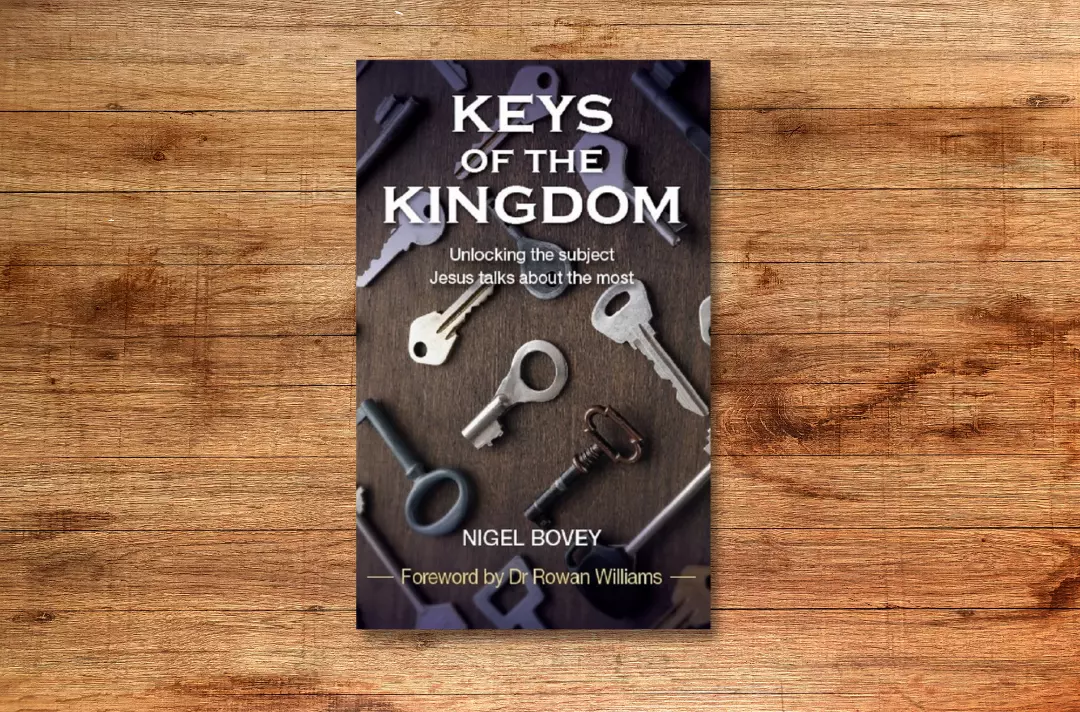4 September 2021
The topic Jesus couldn't stop talking about
Emily Bright interviews Major Nigel Bovey

Major Nigel Bovey tells Emily Bright about his new book exploring the Kingdom of God.
It all began with a compelling concept.
While writing his previous book, Browsing the Bible, Major Nigel Bovey noticed a couple of phrases in the Gospels that kept jumping out – the ‘Kingdom of God’ and the ‘Kingdom of Heaven’.
‘I didn’t have the opportunity then to delve deeper because I was writing about Revelation and beyond,’ recalls Nigel. ‘So I thought: “I’ll come back and have a look at that.”’ In his latest book, Keys of the Kingdom, he does exactly that.
‘I tried to put into 400 words the essential message of each of the 52 occasions in the Gospels where Jesus – or occasionally John the Baptist – talks about the Kingdom of Heaven,’ Nigel explains. ‘The book also provides opportunities to ponder relevant questions that relate to the passages of Scripture and my brief analysis thereof, and personal prayers that relate to it.’
Keys of the Kingdom comes out of Nigel’s experience of being a preacher and Bible teacher of 40 odd years, and tries to distil the truth of what Jesus says. Throughout his ministry, Jesus refers to the Kingdom of God and Kingdom of Heaven over 100 times, more than any other subject.
‘I did a word count of famed or popular sermon topics such as “forgiveness”, “love”, “trust”, “faith” and so on,’ Nigel says. ‘But Jesus doesn’t talk as much about those as he does the Kingdom of Heaven.’
While some may acknowledge Jesus’ emphasis on God’s Kingdom, they may perceive it as a past or future concept. However, Nigel explains that the Kingdom is not just ‘a pie in the sky when you die’. Instead, in his book, he highlights how we wield life-transforming power in the present day through the Holy Spirit.
He takes inspiration from what Jesus models.
‘Time and again, people’s lives are being radically altered because of the presence of Jesus,’ says Nigel. ‘They have more than just a feel-good factor, renewal of faith or encouragement. Some of them are physically changed as Jesus heals the sick, delivers them from demons, cleanses lepers and raises the dead. That same life-changing ministry of healing and reconciliation is alive today.’
While the Kingdom of God can be a tangible reality for all of us today, living out Jesus’ teaching is countercultural and can be extraordinarily challenging.
‘If you read the Sermon on the Mount,’ Nigel continues, ‘you recognise quite quickly and easily that what Jesus is talking about is a whole new way of life. And it goes beyond the law. It’s not just actions that count, it’s attitudes. If we get our attitudes right, our actions will follow.’

During his time on Earth, Jesus sets out the priorities of the Kingdom and examines the attitudes of people against his heavenly yardstick – where love supersedes success.
‘The conversation with the rich young ruler shows that your bank balance counts for nothing in the Kingdom of Heaven,’ observes Nigel. ‘That is completely against this world’s culture of acquisition, attainment and ambition.
‘Rather, God’s Kingdom is ruled by love. When talking to the rich young ruler, Jesus quotes the daily Shema prayer from Deuteronomy: “Love the Lord your God with all your heart and with all your strength and love your neighbour as yourself.” Love is the driving force of the Kingdom.’
Another key characteristic that Nigel explores in his book is joy: ‘I found that, time and again, joy is the overriding emotion of the Kingdom. For instance, in Jesus’ parable of a man who finds treasure in the field unexpectedly, he buys it and goes away with joy. It’s not everyday happiness being described here, but rather a joy that stems from a deep-rooted sense of the presence of God.’
He adds that, as Christians, we have ‘a tendency to lose our sense of joy’ as we become too focused on doing rather than being: ‘Within The Salvation Army, the concept of duty is colossal, and in the wider culture life is about what you do. Yet Jesus never said: “Do your duty.”
‘The Kingdom of Heaven is never a reward for good behaviour or for extra effort. The Kingdom of Heaven is a state of grace.’
Nigel asserts that we cannot bring about the Kingdom of Heaven in our own strength: ‘You don’t have to read very far into what Jesus says about the Kingdom without realising that the standard of behaviour required is immensely challenging.
‘It’s humanly impossible to live up to the standards that Jesus sets in the Kingdom of Heaven. Without a dynamic within us to refine us, to change our attitudes, to guard and guide our actions, it would be impossible. Indeed, in Romans 3:23, Paul tells us we’ve all sinned and fallen short of the glory of God.’
But, Nigel reflects, there is hope when we admit our shortcomings and surrender to God: ‘That’s where the Spirit comes in. It refines our actions, attitudes and reactions to be more like Jesus and shapes us into citizens of the Kingdom.’
Nigel quotes Matthew 16:16–19 as ‘the critical verses’ of his study. In the passage, Peter acknowledges that Jesus is the Son of God, and Jesus tells Peter: ‘On this rock I will build my Church... I will give you the keys of the Kingdom’ (vv18 and 19).
Some have interpreted this to mean that Peter would be the leader of the early Church, but Nigel takes a different view: ‘The Greek word used for “on this rock” is petra, which means “big rock” or “firm foundation”. It is the same word that Jesus uses when he talks about the wise man who built his house upon a rock.
‘Jesus doesn’t build the Church on one person. He builds it on the affirmation that Peter made: “You are the Christ, the Son of God.” And that is essential to entering the Kingdom: to acknowledge Jesus as the Messiah. No one gains access without that.’
Nigel sums up the most important revelation of his study: ‘The very heart of being a citizen of the Kingdom is a personal relationship with Jesus the King: the keys of the Kingdom are forged in the nails of the cross.’
Interview by

Emily Bright
Promotions and Marketing Co-ordinator, Publishing